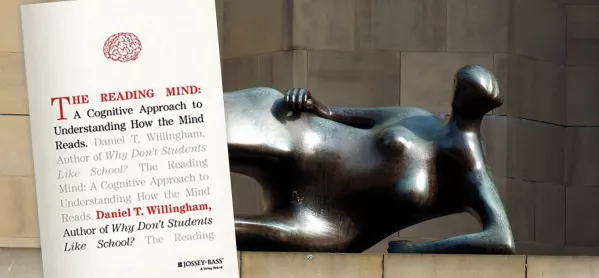- Home
- Book review: The Reading Mind by Daniel T Willingham
Book review: The Reading Mind by Daniel T Willingham

Title: The Reading Mind: a cognitive approach to understanding how the mind reads
Author: Daniel T Willingham
Publisher: Jossey-Bass
256pp, £21.99 (hardback)
ISBN: 9781119301370
For teachers who lean towards the “traditional” approach to teaching, Dan Willingham is the man who started the fightback against “progressivism”.
His book Why Don’t Students Like School? (2009) articulated ideas that many in the profession believed to be true, provable and (crucially), transferable.
For Willingham, “memory is the residue of thought” and thinking is something human beings have to be trained to do in a disciplined manner. For him, subject-specific knowledge is the bedrock of critical inquiry. Claiming such things now seems uncontroversial, but written at a time when teachers were being told to practise brain-gym exercises, or to think about learning styles, such statements seemed almost heretical.
Willingham’s latest book is typically readable, and this is not to be underestimated when you consider the complexity of the subject he is exploring.
Indeed, his style can be almost conversational at times, allowing words such as “yup” to reaffirm his original statement. You begin to notice the granular detail of his writing because he is constantly drawing attention to the cognitive machinery behind the black lines on the page. For him, reading is close to being a prosaic, everyday miracle of human creation and interpretation.
In fact, we often take it for granted until we start thinking about it: and when we do think anew about the process new complexities quickly emerge, which in turn is innately problematic because language is an essential part of our individual and collective identities. Thinking again about language means thinking again about our innate selves. So, it is easier to not think about such things. Or, as Willingham points out early on, “Reading...calls on so many mental processes that an agenda to provide a cognitive explanation comes perilously close to the goal ‘I’m gonna explain the mind’. There’s too much.”
Fascinating journey
Well, there’s not too much of this very succinct book: of its 256 pages, approximately 78 are made up of references, discussion questions, “summaries and implications”, and the index. And there are whole pages given over to diagrams, charts, and other graphics that illustrate various points. Indeed, each chapter is prefaced with its very own agenda. This is not a serious complaint: indeed, so abstruse are some of those points that diagrams are essential for clarifying relation and causality, and this is especially the case when he writes about pictographs and logographs.
Perhaps inevitably, the book reads like a circuitous - but fascinating - journey to get back to where we started out, accompanied by a hugely informed and interesting guide who is keen to hold your hand and explain things several times over to check you’ve understood it all.
And the views unveiled on this journey remind the reader just how astonishingly complex language acquisition is (for instance, Willingham describes how and why it is “impossible to say p in isolation”, and after you’ve read this it changes how you view something so familiar for ever). And his explanation of how and why prosody as well as orthographic representation matter are so crucial to conveying meaning is essential reading for anyone interested in learning (as an English teacher, I felt I was learning something new on every page). And hugely knowledgeable though Willingham is, he is also winningly modest about his own lack of understanding in certain areas: we join him on his desire to know more about how we learn words, and how we use them.
The Reading Mind is a book for all teachers, because we are all teachers of language. And whether you are an NQT in English or a head of maths, this book will remind you of how little we know about our reading minds, and from that realisation comes the pleasure of discovery. It is also reassuring to be told how fundamental reading is to academic progress: the auditory and visual decoding that we engage in every day, and retains its transformative power within the mind, allows us to share the most intimate of ideas with strangers.
Inculcating a reading attitude in a child is one of the biggest challenge a parent, or a teacher, faces, but the rewards are endless. It is salutary, at the start of the new academic year, to be reminded by someone who retains that propensity to be excited by this strange, beguiling alchemy.
David James is deputy head academic at Bryanston School in Dorset
Keep reading for just £1 per month
You've reached your limit of free articles this month. Subscribe for £1 per month for three months and get:
- Unlimited access to all Tes magazine content
- Exclusive subscriber-only stories
- Award-winning email newsletters



